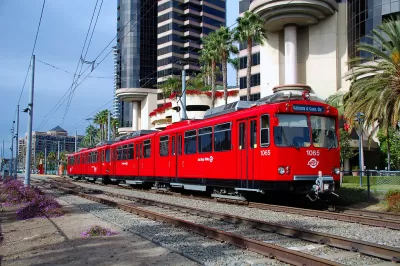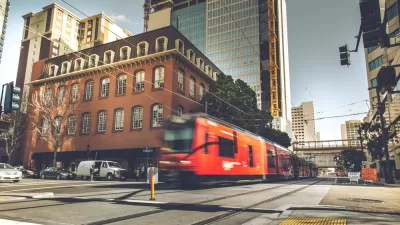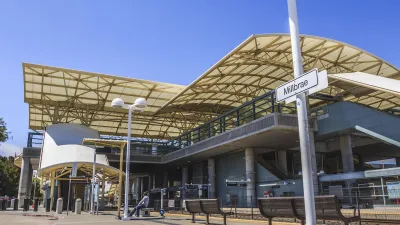Experts attribute the high cost of the project to local opposition and call on state and federal leaders to give transportation agencies more authority over local jurisdictions.

A report from UC Berkeley found that San Diego's Blue Line trolley extension cost double the per-mile average for similar projects, but was completed in half the average time. Joshua Emerson Smith outlines the findings of the study, which also analyzed four other rail projects in the state.
Ethan Elkind, co-author of the report, says the high cost of the San Diego project is indicative of the many challenges faced by rail initiatives in places like California. According to Elkind, the project was "well executed," but remains a "cautionary tale." The San Diego Association of Governments (SANDAG) worked with local stakeholders to reduce opposition and mitigate community concerns, raising the cost of the project by promising new parking spaces in certain areas and elevating the trolley tracks on the UC San Diego campus.
The report recommends that state and federal leaders "crack down" on local opposition to rail projects, with Elkind arguing that "we need to empower transit leaders to make decisions for the good of the region and not always give in to local demands along the route." But agency leaders like SANDAG Executive Director Hasan Ikhrata are reluctant to take an aggressive approach or take away local land use authority.
Other California rail projects have shown varied results: while San Francisco's Central Subway project has encountered major delays and cost increases, L.A.'s Purple Line extension is costing 70 percent of the national average. The report calls the state's beleaguered high-speed rail project "a case study in how not to build rail," citing the project's lack of foresight in securing land acquisition before designing routes.
FULL STORY: San Diego’s Blue Line trolley extension cost twice U.S. average for light rail, study finds

Planetizen Federal Action Tracker
A weekly monitor of how Trump’s orders and actions are impacting planners and planning in America.

Chicago’s Ghost Rails
Just beneath the surface of the modern city lie the remnants of its expansive early 20th-century streetcar system.

San Antonio and Austin are Fusing Into one Massive Megaregion
The region spanning the two central Texas cities is growing fast, posing challenges for local infrastructure and water supplies.

Since Zion's Shuttles Went Electric “The Smog is Gone”
Visitors to Zion National Park can enjoy the canyon via the nation’s first fully electric park shuttle system.

Trump Distributing DOT Safety Funds at 1/10 Rate of Biden
Funds for Safe Streets and other transportation safety and equity programs are being held up by administrative reviews and conflicts with the Trump administration’s priorities.

German Cities Subsidize Taxis for Women Amid Wave of Violence
Free or low-cost taxi rides can help women navigate cities more safely, but critics say the programs don't address the root causes of violence against women.
Urban Design for Planners 1: Software Tools
This six-course series explores essential urban design concepts using open source software and equips planners with the tools they need to participate fully in the urban design process.
Planning for Universal Design
Learn the tools for implementing Universal Design in planning regulations.
planning NEXT
Appalachian Highlands Housing Partners
Mpact (founded as Rail~Volution)
City of Camden Redevelopment Agency
City of Astoria
City of Portland
City of Laramie





























